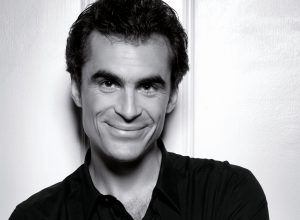- Interview -
Raphaël Enthoven
a philosophical stroll around the theme of wonderment
Accurate wording, fast-paced delivery, thought patterns that are both deep and airy: Raphaël Enthoven cultivates a close relationship with wonderment. He agreed to discuss his enthusiasm regarding this “fundamental” philosophical subject with us in a captivating and astonishing interview.

Professor of philosophy & program presenter on France Culture and Arte, writer and columnist for Philosophie Magazine ©MT. de Jesus Alvarez
What role do astonishment and wonderment play in the philosophical approach?
I would tend to regard these two words as synonyms (since they are so in Greek) and my answer would be that the ability to be astonished is at the very heart of the philosopher’s approach. In a certain way, astonishment (which depends only on oneself) means looking as if for the first time at a given object, person or sight that we are accustomed to seeing. It is not something unusual that sparks amazement, but the opposite.
Is this a natural, or deliberate approach?
It is a deliberate wish to replace one’s own will by a natural reaction. To return to a child’s way of seeing things? In his book Retour à l’émerveillement (A return to wonderment), philosopher Bertrand Vergely evokes this period in which every discovery is an event worthy of wonder, while the adult “locked in his emergencies” ceases to wonder… My only disagreement with my friend Bertrand Vergely, as I have already discussed with him, is that in my opinion, he does not insist enough on the metaphorical dimension of the words “childhood”, which I would describe as the ability to adopt towards the world a virginal way of seeing, hearing and thinking, and “adult”, which refers to the inevitable and yet sorry fact of reducing the world to one’s need for it. In this respect, I agree with him that the exercise of philosophy invites everyone caught in the grind of daily existence to distil from daily life a sense of astonishment with regard to that which no longer surprises us because we are have become so used to it.
Is astonishment the trigger for philosophical thought?
In every respect. The sharing process between various philosophies takes place after astonishments, between the “adults” who move on and the “children” who continue to be amazed. The former tend to dissolve their sense of surprise in their conquest to conquer truth; while the latter maintain astonishment despite advances in knowledge. On the one hand we have Newton who, while astonished that an apple should fall, therein discovers universal laws. On the other, all those who are unimpressed by scientific truth, which itself becomes a source of astonishment. What could be more incongruous, when you think about it, than a theorem? The laws of science are no less astounding than natural phenomena.
… and so we must continue to be astonished in discovering them?
Exactly. The challenge is to continue to experiencing astonishment at times when we could be satisfied with an answer. According to Schopenhauer, “having a philosophical mindset means being able to be atonished by daily realities, while a scholar’s astonishment only occurs when faced with rare, select phenomena”. According to him, no response should shut down the sense of wonder that has dictated the question. Astonishment cannot be dissolved in the solutions that it enables one to establish.
Will all this analyzing and dissecting, can the philosopher maintain the candor that enables him to be astonished?
Do we really exhaust a source of astonishment when we analyze it? If you fall in love, you can dissect the reasons for loving ad infinitum, but none of them will exahust your feelings.
So astonishment is endless …
Yes. It’s a beginning without an end. Maybe the only one within our reach. It’s natural: in actual fact, being astonished is about being astonished to exist. What could be stranger? Indeed, which is the event that astonishes us the most despite the fact that we must all expect it?
Death?
Yes. What could be more predictable? More stupefying? It is in fact very surprising that death surprises us! Yet we remain astonished, awestruck, every time someone dies. And we even feel sorry for that person, as if something incredible had happened to them. What a strange idea. “I know I am going to die, but I don’t believe it” said Jankélévitch. When it comes to avoidance, anything goes. The philosophy of astonishment is tragic because it leads to an acute sense of our own mortality; and happy, because it lives each moment as if it were the first.
So a capacity for astonishment doesn’t make one any happier?
For anyone who regards happiness as a state of comfort, astonishment is more of a disturbance.
And yet it’s a choice …
More of a desire. To feel a sense of wonder, you have to let yourself go, give in, which is hardly compatible with effort.
Can one still be astonished when one is over-exposed to ever more surprising images ? Don’t screens tend to interfere with our capacity for wonderment?
I tend to think that they set the stage for wonderment rather than interfering with it. That the more we are harassed, the more we are paradoxically available for what really counts. However much the world tries to sell us surprises, it has no hold on that which is priceless. I don’t think that our capacity for wonderment is under threat.
And how about you? Does anything in particular astonish you?
Everything. In particular.
Based on an interview by Michèle Wouters
Related articles
Josef Schovanec
– INTERVIEW – Josef Schovanec Philosopher and writer Josef Schovanec tells of his passion for travel in a weekly radio broadcast on Europe 1. Through books such as Je suis à l’est and Voyages en Autistan, published by Plon, he approaches autism through his personal experience. Isn’t being oneself the best means of being original?Being […]
Cyril Aouizerate The original version
– Interview – Cyril Aouizeratethe original version Cyril Aouizerate is a philosopher and urbanist who creates places endowed with soul and meaning, such as the Mama Shelters, the MOB vegan restaurants of Brooklyn and Paris, as well as the MOB hotels that have just been set up in the flea market districts of Saint-Ouen and […]
Charles Pépin
Charles Pépin«The effect that beauty has on us is not superficial» Philosopher, novelist and journalist, Charles Pépin has authored ten or so books that have been translated in many languages. Through his work titled “Quand la beauté nous sauve” (When beauty saves us) he invites us to look up to beauty as a way of experiencing a meaningful encounter with […]
Aging youthfully and more if possible
Aging youthfully and more if possible The most recent scientific discoveries and latest developments in digital technologies open up staggering prospects in the realm of health and longevity. Eternal life… an ancient fantasy which leaves nobody indifferent. The idea that aging could be a reversible phenomenon and that as of today one can stack the […]









